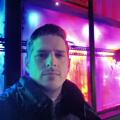garrett reviewed To Paradise by Hanya Yanagihara
Review of 'To Paradise' on 'Goodreads'
2 stars
I hate to say it since so many people I respect gushed over this book but boy did I not like it one bit. I think there are good moments, a reasonable premise and I even appreciate the (minimal) lack of connection or closure! There's just so much to dislike that it's frustrating.
There are tender moments that are worth soaking up but the whole thing veers between NPR subscriber NIMBY in Civil War era NYC and whacky dystopia that was entirely unconvincing and absolutely unhinged (which other reviews said felt "all too real". what???). I don't know. Maybe this is a big whoosh and someone will tell me I "just don't get it" but it is what it is.
I hate to say it since so many people I respect gushed over this book but boy did I not like it one bit. I think there are good moments, a reasonable premise and I even appreciate the (minimal) lack of connection or closure! There's just so much to dislike that it's frustrating.
There are tender moments that are worth soaking up but the whole thing veers between NPR subscriber NIMBY in Civil War era NYC and whacky dystopia that was entirely unconvincing and absolutely unhinged (which other reviews said felt "all too real". what???). I don't know. Maybe this is a big whoosh and someone will tell me I "just don't get it" but it is what it is.

